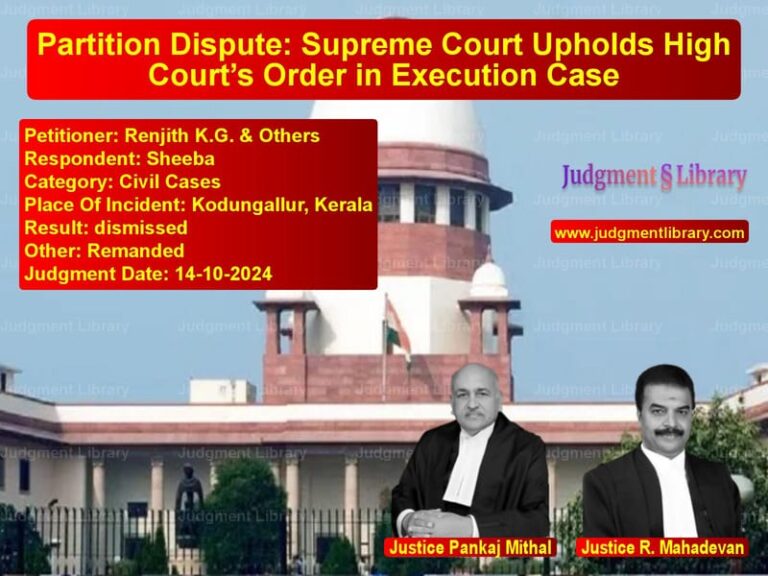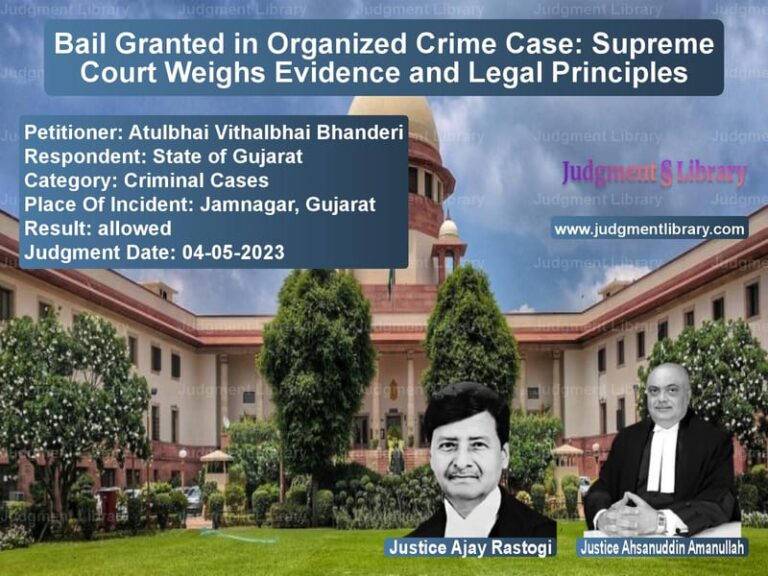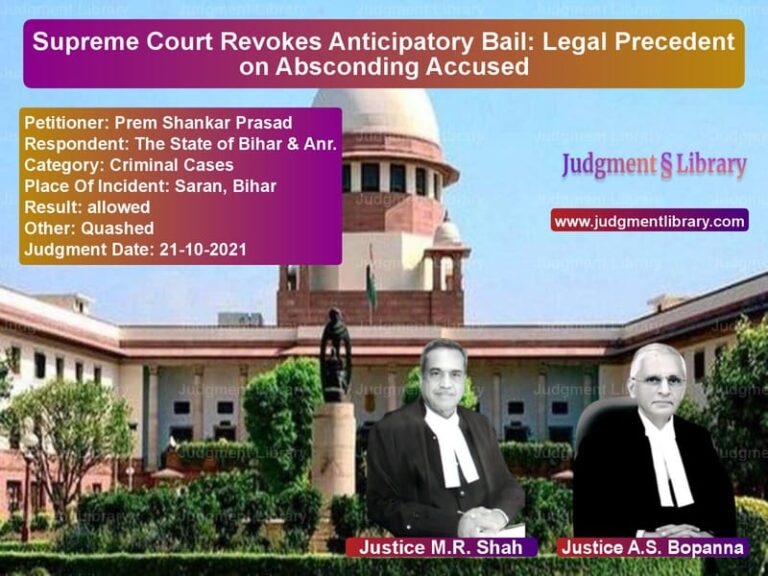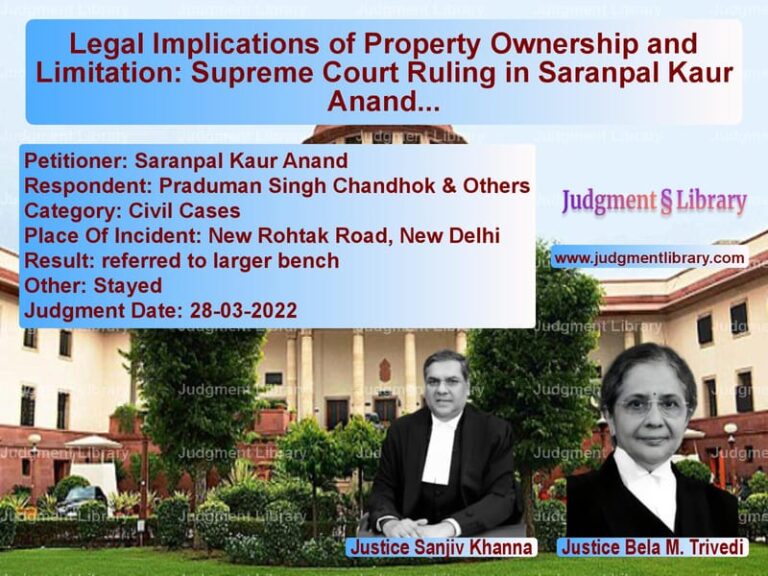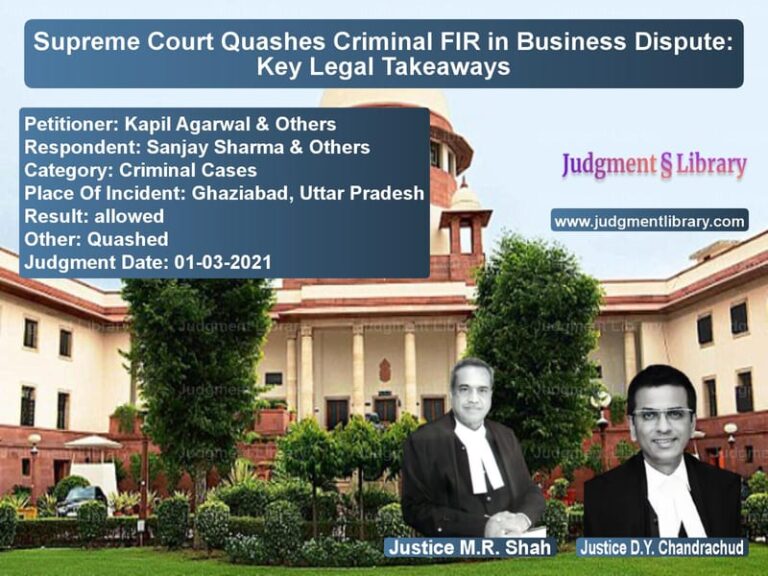Slum Rehabilitation Dispute: Supreme Court Verdict on Susme Builders vs. Slum Rehabilitation Authority
The case of Susme Builders Pvt. Ltd. vs. Chief Executive Officer, Slum Rehabilitation Authority & Ors. is a significant Supreme Court judgment addressing slum rehabilitation disputes in Mumbai. The case highlights the legal complexities surrounding slum redevelopment, the rights of slum dwellers, and the role of developers in ensuring timely project completion. The dispute revolved around the failure of Susme Builders to complete a slum rehabilitation project, leading to prolonged litigation and hardships for slum dwellers.
Background of the Case
The case originated from a redevelopment project in Mumbai’s Santacruz (East) area. The land, initially owned by the Ardeshir Cursetji Pestonji Wadia Trust, was occupied by approximately 800 slum dwellers. A consent decree in 1980 led to the transfer of the land to a cooperative society formed by the slum dwellers, named Om Namo Sujlam Suflam Cooperative Housing Society. The society then engaged Susme Builders Pvt. Ltd. for redevelopment under an agreement dated 27.02.1986, promising permanent housing to the slum dwellers.
Despite multiple agreements and modifications over the years, the project remained incomplete for over three decades. Various legal and administrative hurdles, including changes in Development Control Regulations (DCR) and conflicts between different developers, further complicated the situation.
Key Issues in the Case
- Whether Susme Builders failed to fulfill its obligations under the redevelopment agreement.
- Whether the Slum Rehabilitation Authority (SRA) had the power to remove Susme as the developer.
- The requirement of obtaining 70% consent from slum dwellers for redevelopment.
- The impact of regulatory changes, including amendments in Development Control Regulations (DCR), on the project.
- The legal consequences of delays in the implementation of the project.
Arguments by the Parties
Arguments by Susme Builders
- Susme contended that external factors, such as legal challenges and regulatory delays, were responsible for the project’s delay.
- It argued that the SRA’s order terminating its role as the developer was unjustified.
- Susme claimed it had the consent of more than 70% of the slum dwellers.
- It maintained that the court’s order dated 27.03.2015, which called for a verification of slum dwellers’ consent, should be binding and allow it to continue with the project.
Arguments by Slum Rehabilitation Authority (SRA) and Other Respondents
- The SRA argued that Susme had failed to complete the redevelopment despite multiple extensions and agreements.
- It contended that the removal of Susme was justified under Section 13(2) of the Slum Act due to unexplained delays.
- The respondents highlighted that slum dwellers continued to live in substandard conditions due to Susme’s inaction.
- They also argued that Susme did not secure 70% consent from slum dwellers, as required by the regulations.
Supreme Court’s Observations and Findings
On Delays in the Project
The Supreme Court noted that Susme had been responsible for significant delays in implementing the rehabilitation project. Despite agreements dating back to 1986 and multiple modifications in 1995, 1998, and later, only two buildings were constructed, housing 128 families. The court found that excuses related to legal challenges and regulatory changes were insufficient to justify the excessive delay.
On the 70% Consent Requirement
The court examined whether obtaining 70% consent from slum dwellers was mandatory under the Development Control Regulations (DCR). The judgment clarified:
- “Where 70 percent or more of the eligible hutment dwellers in a slum agree to join a rehabilitation scheme, it may be considered for approval.”
- The requirement existed under the 1991 and 1997 DCR amendments, and it was Susme’s responsibility to secure this consent.
- Susme had failed to meet this requirement, undermining its ability to proceed with the project.
On the Role of the SRA
The court ruled that the SRA had the authority to remove Susme as the developer under Section 13(2) of the Slum Act. Given the prolonged inaction and failure to secure necessary consents, the SRA was justified in handing over the project to another developer.
On Competitive Bidding for Developers
The Supreme Court emphasized that allowing multiple developers to compete for slum dwellers’ consent could lead to manipulation and delay in project implementation. It upheld the principle that once a developer is selected and consents are obtained, those consents should not be easily revoked.
Supreme Court’s Verdict
Based on its findings, the Supreme Court:
- Rejected Susme Builders’ claims and upheld the SRA’s decision to remove it as the developer.
- Declared that neither Susme Builders nor J.G. Developers (another competing developer) could proceed with the project, as neither had secured 70% support.
- Directed the SRA to invite fresh proposals from experienced developers to complete the rehabilitation project within a strict timeline.
- Mandated the protection of slum dwellers’ interests in selecting a new developer, ensuring better housing conditions and compensation for land ownership.
Conclusion
This judgment underscores the importance of timely implementation of slum rehabilitation projects and the role of regulatory authorities in preventing delays. It reaffirms the requirement of obtaining 70% consent from slum dwellers while preventing misuse of this provision through competitive bidding. The court’s intervention ensures that slum dwellers are not left in limbo due to protracted legal and administrative disputes.
By setting a legal precedent, this judgment reinforces the responsibility of developers in executing such projects and the powers of the SRA in ensuring compliance with regulations. The case also highlights the need for stricter monitoring of redevelopment projects to prevent undue delays and protect the rights of slum dwellers.
Don’t miss out on the full details! Download the complete judgment in PDF format below and gain valuable insights instantly!
Download Judgment: Susme Builders Pvt. vs Chief Executive Offi Supreme Court of India Judgment Dated 04-01-2018.pdf
Direct Downlaod Judgment: Direct downlaod this Judgment
See all petitions in Property Disputes
See all petitions in Contract Disputes
See all petitions in Landlord-Tenant Disputes
See all petitions in Judgment by Deepak Gupta
See all petitions in Judgment by Madan B. Lokur
See all petitions in dismissed
See all petitions in supreme court of India judgments January 2018
See all petitions in 2018 judgments
See all posts in Civil Cases Category
See all allowed petitions in Civil Cases Category
See all Dismissed petitions in Civil Cases Category
See all partially allowed petitions in Civil Cases Category


